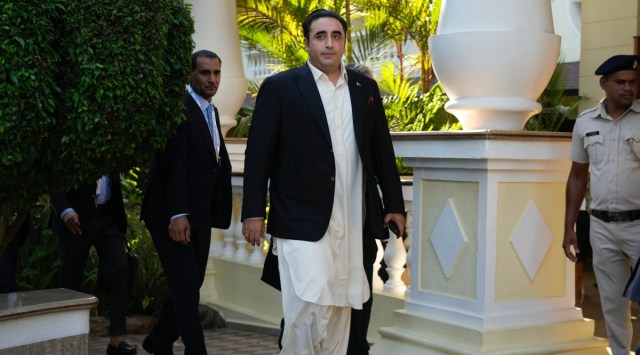
SCO in Goa and the Press Freedom Index
Among matters of global importance this week, the Shanghai Cooperation Organisation (SCO) Foreign Ministers’ meet was the main topic of discussion among Pakistani media outlets. Bilawal Bhutto is the first Pakistani FM to visit India in over ten years.
The focus has been on relaying Pakistan’s “commitment to multilateralism and its goal of playing a leading role at all international forums” (The Nation, May 6). Express Tribune (May 6) reported that “By saying that none should use terrorism as a diplomatic tool, he [Bhutto] was tactically responding to Indian concerns of alleged cross-border terrorism.” News International (May 6) added that Bhutto also talked “about Kashmir in his interaction with Pakistani media present at Goa”, reaffirming that Pakistan’s position on Kashmir “has not changed and it is India that has to create a conducive environment for talks between the two sides.” Even so, at the end of the day, “There is hope that in the future all countries in the SCO can work effectively through multilateral efforts for regional prosperity” (News International, May 6).
The other topic of note was the Reporters Without Borders’ 2023 World Press Freedom Index that moved Pakistan up to the 150th and India down to the 161st spot. Dawn (May 5) says, “These are not enviable statistics for either country”. But for India, “Of particular concern is the fact that powerful business conglomerates with close ties to the ruling party have acquired most mainstream media outlets, ensuring that the ‘patriotic’ narrative muscles out alternative voices.” Dawn further writes, “countries calling themselves democracies should certainly not be resorting to such draconian tactics.” Daily Times (May 4) speaks to Pakistan’s situation saying, “Pakistan has become at least 60 per cent riskier to practise freedom of speech.” In terms of India’s ranking, Daily Times observes that “it would be a futile exercise to pop balloons over the misery of others when our own backyard is shambolic.”
PTI-PDM talks and the attack in Kurram
There were two events of note in the domestic sphere. The first is the ongoing matter of the dissolved assemblies of Punjab and Khyber Pakhtunkhwa. The two political parties PTI and PDM seem to have reached the negotiating table, much to the relief of the citizens in terms of discussions on the election issue. The second is the recent attack on Parachinar in the Kurram district in KP that killed eight school teachers.
On the first issue, Dawn (May 4) says, “credit must be given to the PDM government, that, despite the reservations of some senior figures… it has managed to work towards a consensus. The far-sightedness of those in favour of negotiations on both sides was much needed.” The Nation (May 3) adds that “While negotiating teams from both sides have shown optimism… there are others who have attempted to derail the negotiations.” News International (May 4) is less positive saying that while “talks between the coalition government and the PTI started with a bang”, they have “proceeded without much event, and seem to have ended rather anti-climatically”.
On the second issue of the attack in Kurram, the dominant narrative is that “sectarianism was the root of the problem” (Express Tribune, May 6). Tribune also cautions that “the recent attack leaves no doubt that terrorists still see schools as a preferred soft target”. Daily Times (May 6) says, “What happened in Parachinar isn’t an isolated incident and contextualising it as one would be a huge mistake”. But DT also observed “a group of Shia locals went out of their way to protect Sunni teachers in the aftermath of the shooting to prevent retaliatory violence”, which gives hope that there are “good, well-meaning people on both sides”.
Record-high inflation
The economic situation in Pakistan seems to be worsening continuously. The most debated subjects this week have been record-high inflation and a new hurdle in the IMF loan.
On inflation in the country, The Nation (May 1) says, “The Consumer Price Index (CPI) has already recorded a record-high inflation rate for March, and it is projected to reach 36-38 percent in April.” News International (May 6) says, “food inflation is again leading the trend, clocking in at 45.11 per cent and 51.37 per cent respectively as measured in urban and rural areas”. NI’s verdict is that “Pakistan has been gripped by stagflation”. Daily Times (May 3) adds, “over four million citizens are said to have fallen below the poverty line”.
On the other hand, Dawn (May 4) comments on the “demand for a 100pc increase in the profit margins of the oil-marketing companies” saying, “rising inflation is hurting businesses as much as it is the common people”. Therefore, “Asking consumers to pay a higher price for a low-quality product to improve the balance sheets of oil companies isn’t justified at all.”
On the delay in the IMF loan, the latest issues are the upcoming 10th and 11th reviews that the World Bank does not seem inclined to combine, and insufficient external financing. Dawn (May 6) comments saying, “The new conditions and the refusal to combine the reviews reflect the widening trust gap”. Daily Times (May 6) says, “This crisis is the culmination of decades of shortsighted policies, and there are no quick fixes for our predicament.” But even so, “Securing the bailout is just the beginning”. Daily Times asserts the need for a stronger public conscience and greater accountability saying, “we need to foster public awareness and support for economic reform, empowering citizens to hold the government accountable for its decisions and ensuring that the nation’s interests are prioritised over short-term political gains.”
adya.goyal@expressindia.com